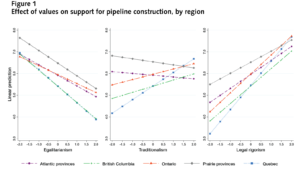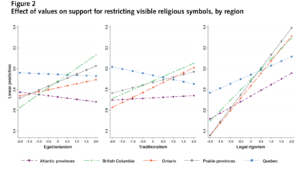
Policy disagreements in Canada are often viewed through a regional lens. This reflects — perhaps unsurprisingly — the decentralized nature of the Canadian federation and the differences in regional and provincial political economies. However, such an interpretation runs the risk of exaggerating differences across regions, and may lead some to question the legitimacy of federal institutions. It also suggests that forging a national consensus on almost any major policy will be difficult.
At the same time, policy debates in Canada are also fundamentally about values. Under this view, Canadians sharing similar sets of values are more likely to perceive issues in a particular way, leading them to form similar opinions on policy issues regardless of their home region.
These two interpretations give rise to the following question: To what extent does regionalism in Canada amplify values-based policy disagreement?
In a recent study published by the IRPP, we examined the relative importance of, and potential interaction between, values and region of residence in the formation of policy preferences. We fielded a large (n=5000) nationally and regionally representative survey in order to measure the degree to which Canadians are divided along three value inclinations: egalitarianism (for which equality in social, political and economic relations is of utmost importance), traditionalism (which places great emphasis on conserving traditional values and way of life) and legal rigorism (which emphasizes the importance of law and order). We then carried out a series of statistical tests (including factor analyses and regression) in order to examine the coherence of values and their relationship with seven public spending domains, as well as 12 policy issues ranging from restrictions on religious symbols to support for oil pipelines.
Segments of the population within specific regions actually have much in common despite enduring differences in the structure of their political economies.
We found, first, that Canadian provinces may not be as individually homogeneous in terms of values as might commonly be assumed. Rather, consistent with a weak form of regionalism, we found that the same sets of values are present in every region, although they are unevenly distributed. For instance, residents of the Prairies have relatively stronger predispositions to conservative values. However, liberal egalitarian values are by no means alien to this region. Similarly, while we find relatively higher levels of egalitarian values in Quebec, we also find that certain types of conservative values – like legal rigorism – are more prevalent in that province relative to the national average. From this perspective, segments of the population within specific regions actually have much in common despite enduring differences in the structure of their political economies.
We also explored whether or not shared values have an impact on the policy preferences of Canadians to the same extent across regions. The results suggest that policy disagreements are driven first and foremost by differences in values, and not by the region in which one lives. As an example, take the debate over new pipeline construction in the country, which is at the centre of current debates around Canada’s energy future as the world transitions toward a low carbon economy in the post-Paris era.
As shown in Figure 1, we find patterns across regions to be remarkably consistent, suggesting that values influence debates around policy across all of Canada’s major regions, whether they are oil-producing or not. Indeed, just as egalitarian values in Quebec are associated with less support for pipelines, egalitarian predispositions among residents living in Alberta (and every other province) similarly dampen support for the building of new pipelines. Conversely, a greater propensity toward legal rigorist values is associated with more positive views around new pipeline construction, and this is as true in Quebec as it is for all other regions we examined.
Another example comes from the recent debate over the restriction of religious symbols, which is often interpreted in Canada as an issue that pits ardently secular Quebec against English Canada. But examining new data from over 5,000 Canadians interviewed from across the federation, we find that Quebec is not that distinct when it comes to this issue.
As indicated by the relatively flat slopes in the left panel of Figure 2, egalitarian values do not appear to shape public opinion on religious dress as much as one might expect. This finding probably reflects the tension that exists between egalitarian predispositions toward framing this issue as one of gender equality on the one hand, or of protecting minority rights, on the other. Meanwhile, we find that a greater predisposition toward legal rigorist values is associated with greater support for restricting religious symbols across all regions. In fact, the strongest support for restricting religious symbols is not found in Quebec, but rather among legal rigorists living on the Prairies, and to a lesser extent, in Ontario and British Columbia.
On a range of other issues, from abortion to foreign policy, we find remarkably similar patterns across regions — the same values explain the same contentious policy disagreements across Canada, which suggests that a weak form of regionalism best characterizes policy disagreements in the federation. Moreover, compared to other explanatory factors, we find that values explain a considerable amount more of observed differences in the preferences of Canadians. This holds in models that control for age, gender, religion and partisan affiliation, which account for much less of the overall variation in policy preferences.
The upshot is that there may be a tendency to exaggerate the role of regions as the primary source of policy disagreement in Canada. Our paper thus highlights three main implications for thinking about policy disagreements, and how they might be surpassed.
- Regional differences might be overcome through carefully reframing issues in ways that mobilize the value predispositions present in all regions.
- Those who seek support for policies may wish to develop regionally sensitive communications strategies, notably to appeal to a region’s dominant value orientation or to appeal to values that have been overlooked in specific regions by policy-makers in the past.
- Provincial policy-makers may find it beneficial to exchange with their counterparts in other provinces when developing policies and strategies. This may enhance their capacity to frame proposals in ways that appeal to specific sets of values and to build cross-regional support.
To be sure, policy disagreements are a legitimate part of any well-functioning democracy. However, when they become too entrenched, or are exaggerated by the media, they may be distinctly unhelpful when it comes to developing policy solutions to complex problems. Although regional differences cannot be ignored, our research suggests that paying greater attention to values has much to offer in terms of better interpreting policy disagreements, and that appealing to shared values may actually attenuate regional clashes over policy. This may, in turn, enhance the quality of public debate in Canada, as well as the legitimacy of public policies and programs.
Photo: By Shutterstock/Harvepino
Do you have something to say about the article you just read? Be part of the Policy Options discussion, and send in your own submission. Here is a link on how to do it. | Souhaitez-vous réagir à cet article ? Joignez-vous aux débats d’Options politiques et soumettez-nous votre texte en suivant ces directives.









